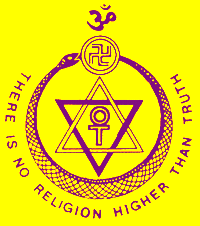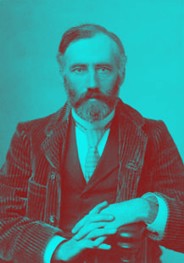Instant Guide
To Theosophy


William Quan Judge
1851 - 1896
Theosophy Defined
By
William Quan Judge
Theosophy
[from Gr. theosophia knowledge of divine things, deriv. of theosophos wise about
God; theos God + sophos, wise]: a name which, as specifying a religious
philosophy, was originated by Ammonius Saccas in the third century of our era.
The body of
ethical, philosophic, and scientific doctrines to which that title applies is,
however, as old as humanity itself, and contains everything that is true in all
other and later systems. Esoterically preserved and transmitted in its entirety
by adepts and initiates, from time immemorial, their messengers -- known to the
world as "great teachers" and "saviours"
-- have, at periodic intervals determined by cyclic law, exoterically taught as
much of it as could safely be given out and which any considerable portion of
our race could at such times receive and assimilate.
Theosophy
teaches a knowledge of the laws governing the
evolution of the universe. It is not based upon assumed divine revelation, but
upon consciousness. It sees no unsolvable mystery anywhere, throws the words
coincidence and chance out of its vocabulary, and affirms the omnipresence and
omnipotence of law and perfect justice.
Theosophy
postulates an Eternal Principle, unknowable except in its manifestations, which
is in and is all things, and which, periodically and eternally, manifests
itself and recedes from manifestation -- evolution and involution. Its opposite
poles in the manifested universe are spirit and matter, which are coexistent
and inseparable.
In
manifesting itself the spirit-matter differentiates on seven planes, which are
of progressive density down to that within our sensuous perception, the
substance in all being the same, but differing in the proportions of its two
compound elements. Through all thrill ceaselessly vibrations which are the
inexhaustible impulse from the First Cause. These vibrations are distinct, each
from all the others, and each always the same in mode upon every plane, but
differing in rate according to the rarity or density of the substance of the
plane. By means of these vibrations are brought about all forces -- phenomena
in nature, specialized differentiations and effects of creation, preservation,
and mutation -- in the world of forms as well as upon the ethereal planes.
Thus every
atom of the universe is infused with spirit, which is life in one of its phases
of manifestation, and endowed with qualities of consciousness and intelligence
-- likewise phases of the spirit -- in conformity to the requirements of its
differentiation.
On the lowest
material plane, which is that of humanity, the spirit focalizes itself in all
human beings who permit it to do so. Its rejection is the cause of ignorance,
from which flow all sin, suffering, and sorrow; by its conscious acceptance man
becomes partaker of the Divine Wisdom, "one with the gods," entering
into possession of an ever-increasing power of consciousness, and attains
oneness with the Absolute. This is the ultimate destiny of all beings; hence
Theosophy affirms the perfectibility of the race and rejects the concept of
innate unregenerable wickedness.
From the theosophic point of view the world is compounded of the
Egos or individual spirits, for whom it emanates from the Divine Will; and its
evolution is due to the impulse imparted by its spiritual element, that force
manifesting itself from the beginning in the primary conditions of life -- far
below the sentient stage -- and having in the evolvement of higher forms,
including man, the guidance and direction of intelligent, perfected beings from
other and older evolutions. Hence man is deemed a conscious spirit, the flower
of evolution; while below him, in the lower kingdoms, are other less-advanced
classes of egos, all, however, on the way of ascent to the human stage, which
they will eventually reach when man has gone on still higher.
The
perfecting of self-consciousness is the object of evolution. By this man is
enabled to reach more exalted stages of existence. And his conditioned mortal
life is for the purpose of affording him experience by which that
self-consciousness may be developed and cognition of the spirit attained.
Man is a
spirit and requires vehicles with which to come in touch with all the planes of
nature included in evolution, and it is these vehicles that make of him an
intricate, composite being, liable to error, but at the same time able to rise
above all delusions. He is in miniature the universe, for he is, as spirit,
manifesting himself to himself by means of seven differentiations. Therefore he
is characterized in Theosophy as a septenate or
sevenfold being. His immortal being comprises a trinity, spirit (Atman), the
spiritual soul or discernment (Buddhi), and mind (Manas).
This triad
requires as vehicles or instruments through which to operate and gain cognition
in matter four lower mortal principles.
These are:
The animal passions and desires, unintelligent and productive of ignorance
through delusion (
The Linga Sarira belongs to the
astral plane of matter, which, being next above that of our tangible world in
refinement of its substance, is just beyond our normal
sensuous perception. As the physical body is at death reabsorbed into the
material elements whence it was drawn, so the astral body is eventually
dissipated in and absorbed by the substance of its plane; but its permanence is
much greater than that of the gross body. During life it is from the earliest
moment until the last the model upon which are molded the physical molecules of
which the body is composed, and through it the life-principle is enabled to
animate the aggregate mass as a collective entity. These lower four principles
or sheaths are the transitory, perishable part of man -- not himself, but in
every sense the instruments he uses -- given up at the hour of death and
rebuilt at every new birth. The trinity is the real man, the thinker, the
individuality that passes from house to house, gaining experience at each
rebirth, while it suffers and enjoys according to its deeds. In each successive
earth-life he is known to others as a new personality, but in the whole stretch
of eternity he is one individual, conscious of an identity not dependent on
name, form, or recollections of personalities. This doctrine of reincarnation
is the very base of Theosophy, for it explains life and nature as no other
hypothesis can; and it is an essential to the scheme of evolution, for without
such re-embodiment on the plane of experiences and atonements there could be no
evolution of the human soul.
The Ego
returning to mortal life only goes into the family which either completely
answers to its whole nature, gives an opportunity for its evolutionary
progress, or is connected with it by reason of events in past incarnations and
causes mutually created. Inseparable from the doctrine of reincarnation is that
of Karma, or justice, sometimes called the "ethical law of
causation." Mere entry into life is no fit foundation for just reward or
punishment, which must be the deserts for prior conduct. But such consequent
awards determine entry into life, and with unerring equity establish the
sequence of good and evil happenings in requital of the past.
Effect is
always in cause, and thus the body, brain, and intellectual faculties furnished
by reincarnation being products of one's own deserving, become the field from
which must be gleaned the harvest planted by acts in the past. The law of Karma
applies in physical nature as well as in ethics to solar systems, planets,
races, nations, families, and individuals. With reincarnation the doctrine of
Karma explains the misery and suffering of the world, and no room is left to
accuse nature of injustice. The misery of any nation or race is the direct
result of the thoughts and acts of the Egos who make up the race or nation. If
they did wickedly in the past, they must suffer the inevitable consequences. To
this end they must go on incarnating and reincarnating until the effects they
caused have been exhausted. Though the nation thus suffering chastisement
should for a time disappear, the Egos belonging to it could not leave the
world, but would reappear as the founders of some new nation in which they
would continue to receive their karmic due.
With
reference to postmortem conditions, Theosophy teaches two states of existence
somewhat analogous to the Christian "purgatory" and
"heaven." The first, immediately subsequent to earth-life, is Kama-loka, where the immortal triad takes leave of the lower
principles remaining after separation from the body. Thence the Ego passes into
Devachan. The former is, as its name indicates, a place -- the astral plane
penetrating and surrounding the earth -- the latter a state of being, or rather
of consciousness.
In Kama-loka all the hidden passions and desires are let loose, and
enough mentality is retained to make them tortures. When the astral body in
which they cohere is disintegrated, as it is in time, they remain a sort of
entity in the Kama-Rupa, a form of still less materiality than the Linga Sarira. Eventually this too
is said to fade out, leaving only their essence, the Skandhas, fateful germs of
karmic consequence, which, when the Ego emerges from the devachanic
state, are by the law of attraction drawn to the new being in which it
incarnates.
Owing to the
law of cohesion between the principles, which prevents their separation before
a given time, the untimely dead must pass in Kama-loka
a period almost equal to the length life would have been but for the sudden
termination. Losing the body has not killed them. They still consciously exist
in the astral body, and in the case of very wicked and forceful persons -- some
executed criminals, for instance -- may be even more harmful on the astral
plane than they were in life.
Prolonged kama-lokic existence is no injustice to the victims of
accident, since death, like everything else, is a karmic consequence. Finally,
it may be said of Kama-loka that it is the last
conscious state of the thoroughly evil human souls bereft of the spiritual tie
and doomed to annihilation (Avichi).
Having in
life centered the consciousness in the kamic
principle, preserved intellect and rejected the spirit, leading persistent
lives of evil for its own sake, they are the only damned beings we know. Pure
souls speedily pass from Kama-loka to the devachanic state. It is a period of rest; a real existence,
no more illusionary than earth life, where the essence of the thoughts of life
that were as high as character permitted expands and is garnered by the soul
and mind. When the force of these thoughts is fully exhausted the soul is once
more drawn back to earth, to that environment which will best promote its
further evolution.
No new ethics
are presented by Theosophy, as it is held that right ethics are forever the
same. But in the doctrines of Theosophy are to be found the philosophical and
reasonable basis of ethics and the natural enforcement of them in practice.
The present
worldwide interest in Theosophy dates from 1875, when Helena P. Blavatsky, a
messenger of the adepts, appeared in New York, initiated the theosophic movement, and, with Henry S. Olcott, William Q.
Judge, and several other persons, formed the Theosophical Society. Other
revivals of the ancient doctrine, occurring in the last quarter of each century
during several hundred years past, are matters of historic record; but, as
their times were not propitious, they amounted to little in their effect upon
humanity at large compared with the importance this one has attained.
The
Theosophical Society, though its members generally, no doubt, subscribe to theosophic doctrine, is not dogmatic, but admits to
membership all who can conscientiously accept its three avowed objects:
1. "To
form the nucleus of a Universal Brotherhood of Humanity without any
distinctions whatever.
2. To promote the study of ancient and modern religions,
philosophies, and sciences.
3. To investigate
unexplained laws of nature and the psychical powers of man."
Starting with
a membership of fifteen persons in 1875, it has spread all over the globe,
until now it has hundreds of branches scattered through all the civilized and
even the semi-civilized countries, and counts its members by thousands. Beyond
its organization in importance, however, is the wonderful influence of theosophic teachings in coloring the literature, thought,
ethics, and even scientific progress and religious expression of the world. The
size of the Society gives but a very imperfect idea of the extent of its work.
The best
books conveying instruction in detail concerning theosophic
doctrine -- but a meager skeleton of which has been offered in the foregoing --
are the following: H. P. Blavatsky, The Secret Doctrine (1888); Isis Unveiled
(1877); The Key to Theosophy (1889); William Q. Judge, The Ocean of Theosophy
(1893); A. P. Sinnett, Esoteric Buddhism (1883); Five Years of Theosophy,
selections from The Theosophist (1885); Rama Prasad,
Nature's Finer Forces (1890); Patanjali (Judge's
version) Yoga Aphorisms (1889). A score of theosophic
magazines are issued in half as many languages. The leading one of the
Theosophical Society in
Is Theosophy a Religion ? By H P
Blavatsky
A Textbook of Theosophy By C W
Leadbeater
Outline of Theosophy By C W
Leadbeater
Theosophy and the Theosophical Society
Events
Information Line 029 2049 6017
_______________________
Find out
more about
Theosophy
with these links

Cardiff Theosophical Society meetings
are informal
and there’s always a cup
of tea afterwards
The Cardiff Theosophical Society Website
The National Wales Theosophy Website
This is for everybody not just people in Wales
Independent Theosophy Blog
One liners and
quick explanations
H P Blavatsky is
usually the only
Theosophist that most
people have ever
heard of. Let’s put
that right
The Voice of the Silence Website
Dave’s Streetwise Theosophy Boards
If you run a Theosophy Study Group,
please feel free to use
any material on this site
The Most Basic Theosophy Website in the Universe
If you run a Theosophy Study Group you can use
this as an
introductory handout
An Independent Theosophical Republic
Links to Free Online Theosophy
Study Resources; Courses,
Writings,
The main criteria
for the inclusion of
links on this site is
that they have some
relationship (however
tenuous) to Theosophy
and are lightweight,
amusing or entertaining.
Topics include
Quantum Theory and Socks,
Dick Dastardly and Legendary Blues Singers.
No
Aardvarks were harmed in the
Includes stuff
about Marlon Brando, Old cars,
Odeon Cinema
Burnley, Heavy Metal,
Wales,
Cups
of Tea, Mrs Trellis of North Wales.
The Spiritual Home of Urban Theosophy
The Earth Base for Evolutionary Theosophy
Classic
Introductory Theosophy Text
A
Text Book of Theosophy By C
What Theosophy Is From the Absolute to Man
The Formation of a Solar System The Evolution of Life
The Constitution of Man After Death Reincarnation
The Purpose of Life The Planetary Chains
The Result of Theosophical Study
Preface
Theosophy and the Masters General Principles
The Earth Chain Body and Astral Body Kama – Desire
Manas Of
Reincarnation Reincarnation Continued
Karma Kama Loka
Devachan
Cycles
Arguments Supporting Reincarnation
Differentiation Of Species Missing Links
Psychic Laws, Forces, and Phenomena
Psychic Phenomena and Spiritualism
Karma Fundamental Principles Laws: Natural and Man-Made The Law of Laws
The Eternal Now
Succession
Causation The Laws of Nature A Lesson of The Law
Karma Does Not Crush Apply This Law
Man in The Three Worlds Understand The Truth
Man and His Surroundings The Three Fates The Pair of Triplets Thought, The Builder
Practical Meditation Will and Desire
The Mastery of Desire Two Other Points
The Third Thread Perfect Justice
Our Environment
Our Kith and Kin Our Nation
The Light for a Good Man Knowledge of Law The Opposing Schools
The More Modern View Self-Examination Out of the Past
Old Friendships
We Grow By Giving Collective Karma Family Karma
National Karma
India’s Karma
National Disasters
Try
these if you are looking for a local group
UK Listing of Theosophical Groups

General pages
about Wales, Welsh History
and The History of
Theosophy in Wales
Wales is a
Principality within the United Kingdom
and has an eastern
border with England. The land
area is just over 8,000
square miles. Snowdon in
North Wales is the
highest mountain at 3,650 feet.
The coastline is
almost 750 miles long. The population
of Wales as at the
2001 census is 2,946,200.
__________________________________________
into categories and
presented according to relevance of website.